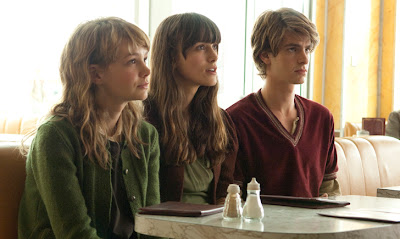We all ponder on the purpose of our lives some point or the other. Why are we born where we were, what are we supposed to do and do we truly control our destinies. Mankind is nothing but a speck in the vast expanses of the universe, the glorious galaxies, the gazillion stars and their planets. We might be nothing but an minor, insignificant, accidental occurrence. Knowing this might very well makes us cynical and nihilistic, but it could also lead us compassion and love. The choice between the two determines if we end our brief journeys in time with regret or contentment.
Somewhere in 2010 this movie got released and garnered lot of acclaim in the film festivals that it was screened and also in critics. And I'm surprised that I never heard of it till recently. It stars Carey Mulligan, who I absolutely adore, along with Andrew Garfield, who hasn't put a wrong foot forward in his fledging career, and Kiera Knightley, who feels like a veteran now amidst the rest of the cast. The movie is based on Kazuo Ishiguru's novel by the same name. I had watched 'Remains of the day' (he won a Booker for this) which was also based of his book and starred Anthony Hopkins & Emma Thompson. 'Remains of the day' is as different a setting from 'Never let me go' as chalk and cheese. But the themes and poignancy of the protagonist share an unmistakable similarity. Both are about predestined lives and living up to the expectations and fulfilling duties that are set by others. They both touch upon the regret of unrequited love and finally longing for what could have been. Melancholy has never found a truer chronicler.
'Never let me go' is a film/book set in a alternate dystopian universe where cloning was discovered in 1952 and it enabled humans to breed clones, that provided organs when their own ones failed, thus letting them live more than 100 years. That was the synopsis provided on the cover of the DVD, but the movie itself starts of in a boarding school set in a remote area in English country. The kids are a bunch of different personalities like you would see in a normal school. But slowly you realize there is something unusual about the school based on how the Head mistress and teachers talk about tradition. There are also some innocuous looking, but odd things that seem to occur. Eventually one of the teachers breaks the suspense and lets us viewers and the kids themselves know that they are destined to be organ donors. The movie focuses on 3 of the kids: Kathy, Ruth & Tommy. Kathy is the protagonist and narrator of the story and movie is told from her point of view. Tommy is a shy boy who seems to have his own problems of rage. Kathy and he share a special bond and their relationship unravels in gentle & intimate fashion. Ruth is Kathy's best friend and is very bossy and talky girl. In a curious twist, Ruth & Tommy end up in a relationship as Kathy is left to console herself. The rest of the movie chronicles how the 3 characters end up.
There is a telling speech in the first act, where the school principal gives a speech in some sort of annual day event where we she boasts about tradition of the school towards donation and how they have proudly held up their standards. The donor kids even after they grow up to be teenagers (or 20 somethings) still talk about 'completing' successfully after their donations. In some ways, the movie reminds us hows kids can be influenced when they are young into what is right and wrong and what the purposes of their lives are. Things like religion, power equations, societal mores are drilled into our heads and minds almost like the 'sleep-learning' process in 'Brave New World'.
Even though it has a lot of subtext in the story, and in a lot ways it is allegorical, the movie bravely focusses on the human story. It is about empathy first and then everything else. And that is a good thing, because we're invested in the stories of the 3 kids. And within the setting, the emotions are very relatable. Love, jealousy, anger, regret and longing are all our own and to see each these beautiful kids, who have no parents in the conventional sense go through them is very moving. The value of life and value of moments which are like sand particles from a beach that flow away when clenched is invaluable. We must live our lives as they are wrought, but we do have choices to make that define who we are.
Somewhere in 2010 this movie got released and garnered lot of acclaim in the film festivals that it was screened and also in critics. And I'm surprised that I never heard of it till recently. It stars Carey Mulligan, who I absolutely adore, along with Andrew Garfield, who hasn't put a wrong foot forward in his fledging career, and Kiera Knightley, who feels like a veteran now amidst the rest of the cast. The movie is based on Kazuo Ishiguru's novel by the same name. I had watched 'Remains of the day' (he won a Booker for this) which was also based of his book and starred Anthony Hopkins & Emma Thompson. 'Remains of the day' is as different a setting from 'Never let me go' as chalk and cheese. But the themes and poignancy of the protagonist share an unmistakable similarity. Both are about predestined lives and living up to the expectations and fulfilling duties that are set by others. They both touch upon the regret of unrequited love and finally longing for what could have been. Melancholy has never found a truer chronicler.

